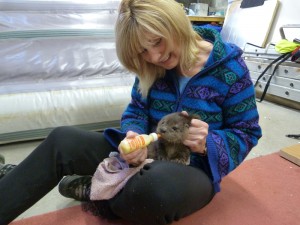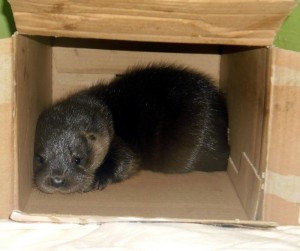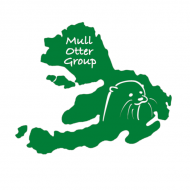A young otter abandoned on the Isle of Mull has been rescued by members of the Mull Otter Group (MOG) and transferred into the care of specialists on the Isle of Skye. The infant cub, thought to be as young as eight weeks, was located at Loch Scridain, in the South of the island , by MOG member, Nigel Burch.

Nigel, a local otter expert, who has been studying these mammals on the Isle of Mull for the past 25 years, said: “It is very unusual for otter cubs to leave the sanctuary of their natal holt before they are at least 12 weeks of age.
It was apparent from its behaviour that this cub had become isolated from its mother and was unable to feed. It was in need of help.”
As the cub was becoming increasingly distressed and in danger of dying, the Mull Otter Group sprang into action with a plan to rescue and rehabilitate the baby otter.
After being picked up, the infant otter was taken into the care of Jane Stevens, the Chair of the Mull Otter Group, who initially fed the cub with a prescribed formula of water, sugar, salt and baking powder, in order to rehydrate the unfortunate animal. This feeding regime was undertaken every 3 hours over a 48-hour period, until the otter was deemed well enough to travel to the Isle of Skye for the main part of its rehabilitation.
Jane commented:
“This is a feel good story that will, hopefully, have a happy ending and one that will see this individual otter returned to the wild on the Isle of Mull sometime in the future. This is one of the reasons that the Mull Otter Group was set up in the first place. There is no doubt that this young cub would have died if we hadn’t intervened on its behalf. However, wild animals should never be picked up and taken into care unless there is absolutely no alternative.”
With the assistance of Ruth Fleming, the orphaned cub was transferred into the specialist care and support of the International Otter Survival Fund (IOSF) based on the Isle of Skye.
Second distressed otter cub rehabilitated
A second young otter cub, believed to be a male and as little as 10 – 12 weeks old, has been found in the South-east of the island displaying unnatural behaviour towards members of the public. On investigation by members of the Mull Otter Group, it was thought in the best interests of this animal to arrange for it to be picked up and taken into care of experts at the Otter Rescue Centre on the Isle of Skye.
The Mull Otter Group would like to thank Dr Frank Teunisse, Heleen van Haaren and Jenny Smith for highlighting their concerns regarding the behaviour of this animal and to Ruth Fleming and Stuart Gibson, who kindly agreed to transport this young cub from Mull to the Isle of Skye.

Jane Stevens continued:
“The Autumn and early Winter period is a particularly difficult time for otters on the Isle of Mull, especially for those bitches with young cubs. Otters can become confused at this time with the reduction in day length and diminishing day and night-time temperatures. It’s at these times that young otters may be encountered displaying abnormal behaviour towards humans and turn up in unusual places, like farm out-buildings, on the Isle of Mull.”
Unfortunately, the first cub to be found has since succumbed to its trauma while in rehabilitation at the Otter Rescue Centre. However, the second infant otter appears to have settled in quickly to its new surroundings on the Isle of Skye.
Grace Yoxon, of the International Otter Survival Fund, based at Broadford on the Isle of Skye, commented:
“Your little ‘monster’ is doing well. I say ‘monster’, as he is probably the most fiery one that I’ve ever come across.”
Initial signs appear good for this young Isle of Mull otter and it is everyone’s wish that its rehabilitation continues at pace and that one day it will be re-released back into the Mull countryside.
The Mull Otter Group has been extremely active behind the scenes promoting the welfare and conservation needs of the island’s otter population in recent months. After a few technical problems, the Mull Otter Group Facebook page is now active and receiving positive feedback from the otter-friendly world; a web-site has been established and is currently under construction; and an informative leaflet, ‘Otter Watching On Mull’, written by local ecologist, John Clare, is in the process of being printed.
Jane Stevens continued:
“Inevitably, greater awareness of local otter issues will mean an increased number of reports of sick, injured or abandoned animals from well-meaning members of the public. As with any embryonic group, the Mull Otter Group has to learn to walk before it can run. However, the initial support from the local community and experts at the International Otter Survival Fund has been extremely positive.
It is to be hoped that, by everyone pulling together, the Mull Otter Group can make a consistent and long-term contribution to the well-being of otters on the Isle of Mull.”
